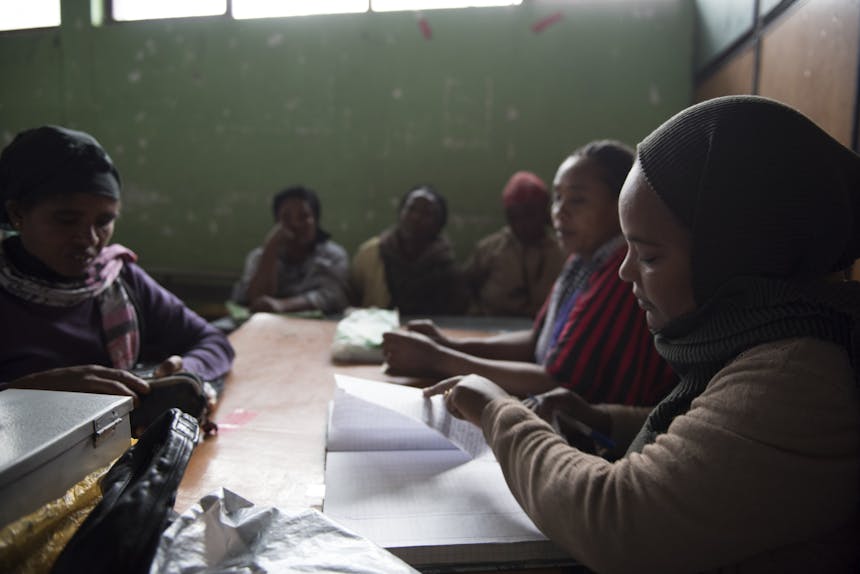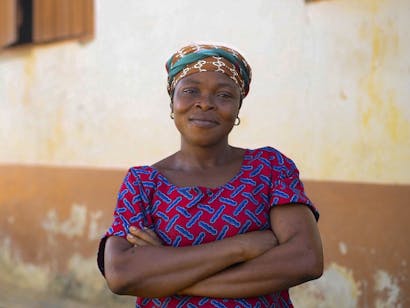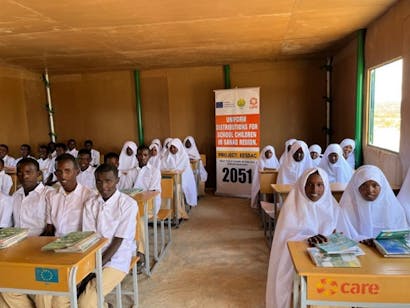How VSLAs were central to success
A global success – In 1991, CARE harnessed the ancient practice of group savings in a new concept called the Village Savings & Loans Associations (VSLA). This programme particularly focused on women, and provided a safe way to save money and access loans. Without outside capital, the VSLAs were introduced as a tool to bring financial services to rural areas of low-income countries, where access to formal financial services is typically very limited. This innovation simply needed a lockbox, three keys and basic financial training for its members.

A VSLA is a self-managed group of 20-30 individuals that meets on a regular basis to provide its members a safe place to save their money, to access loans, and to obtain emergency insurance.
Today, 29 years later, the VSLA members number almost 8.4 million across Africa and other continents. In 54 countries, people are managing more than US$2.34 billion per year through CARE VSLAs. They are turning financial independence into better lives — for themselves, their families and their communities.
An important step
Across low-income countries, approximately 8 to 10 million small and medium-sized enterprises (SMEs) are owned by women, which accounts for 31-38% of SMEs in emerging markets. Entrepreneurial activities constitute a large proportion of women’s paid work, and are therefore an important step towards economic independence and empowerment.
However, limited access to financial services, remains one of the most challenging barriers for women entrepreneurs. Compared to men, women on average have less access to services such as checking and savings accounts, credit, and insurances. Women also have lower average levels of education and business experience, and fewer professional networks that can be used to mobilise resources. In addition, in many countries, regulatory frameworks or social norms disadvantage women, for example by prohibiting property ownership.
“VSLAs are very much a part of CARE Ethiopia’s ethos. For our ‘Women for Women’ project we used VSLAs as an entry point to help the women to support one another both financially, as well as personally.”
Misrach Mekonnen, Project Manager, CARE Ethiopia.
Modus Operandi in Ethiopia
At CARE Ethiopia, VSLAs are a central part of the ethos of supporting women both financially and socially. In Ethiopia, savings and loans combined with literacy and business development skills have been shown to increase women’s confidence to engage in individual business ventures, as well as confidence to engage in meetings and other community events. In this sense, VSLAs are used as a vital tool to kick-start an enterprise.
Right from the outset of the ‘Women for Women’ project it was decided to bring together groups of women to participate in the basic ‘Reach-Up’ business training. These groups were then supported to set up VSLAs together. The habit of meeting and saving together with the same women that underwent the training created a very strong support network for the women. Reintje van Haeringen, Chief Executive of CARE Netherlands adds:
“For the women in this project, the group and the network were really important. It wasn’t just business support that the women gave one another; when someone got sick or had a financial problem, the rest of the group would help her out and take her with them. That was true solidarity that I had not seen coming.”
Leadership capacities
Groups of women were brought together to make weekly contributions for savings. The groups elected their own executive. Members can make requests for a loan from the group and these are approved or denied based on a collective group deliberation, informed by rules and regulations. Loans that have been lent are to be paid back within a defined time period by the group with a monthly interest ranging between 5% and 10%. The interest is added to the group’s loan fund. This cycle runs for a period of 12 months.
The VSLAs formed through the project have increased women’s access to loans, financial literacy and business management skills, which then allowed them to develop and expand their businesses, and earn an income. In addition, the VSLA has helped the women to exercise their leadership capacities at the individual, enterprise, household and community levels. Women also said that contributing financially to their social funds for those in need helped build their social capital. Overall a win-win situation for all the women involved.
Read the Collective Power report about women entrepreneurs in Ethiopia here.
Photo credit: Michael Tsegaye/CARE
All sources and references can be found in the full report


